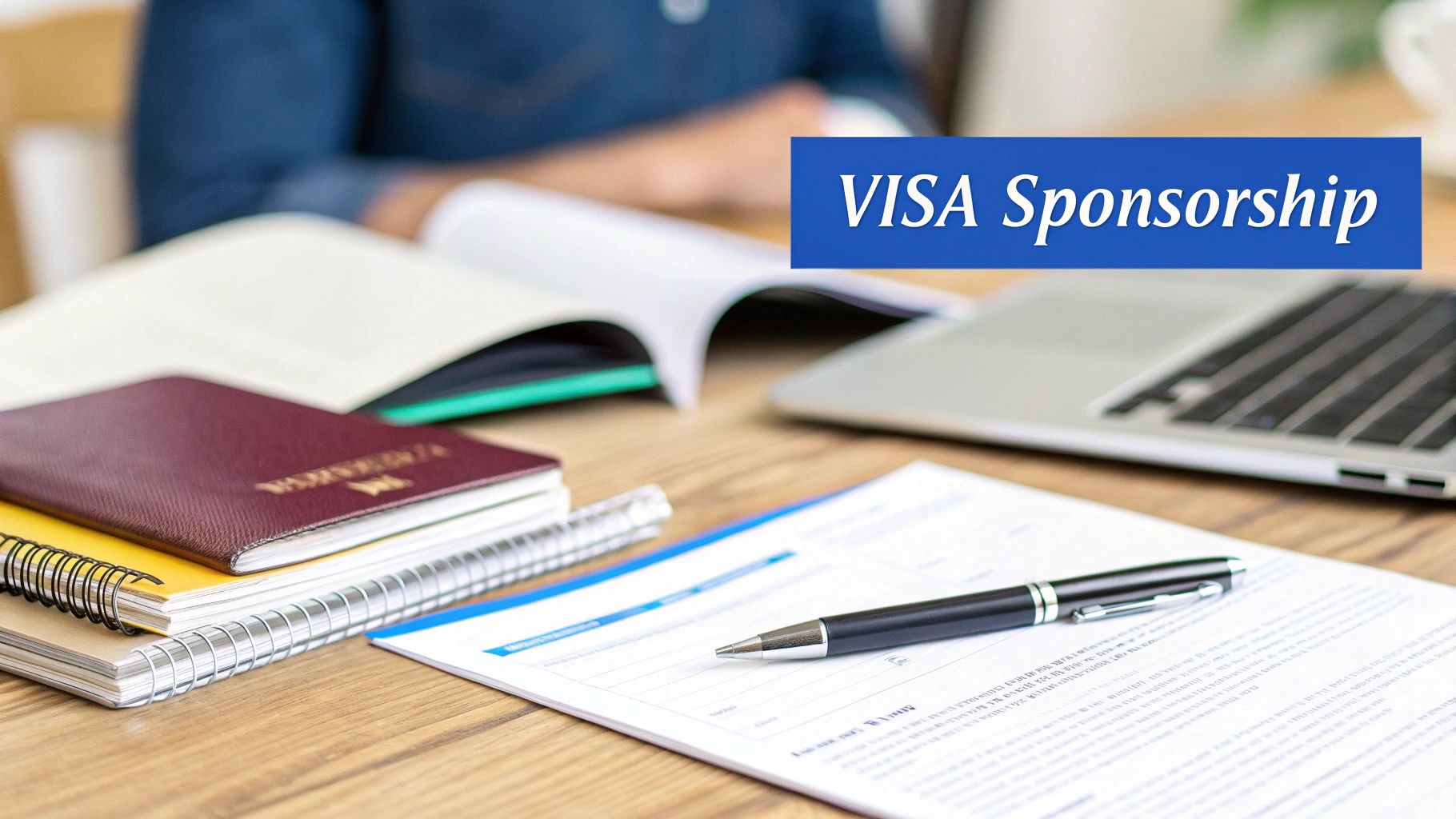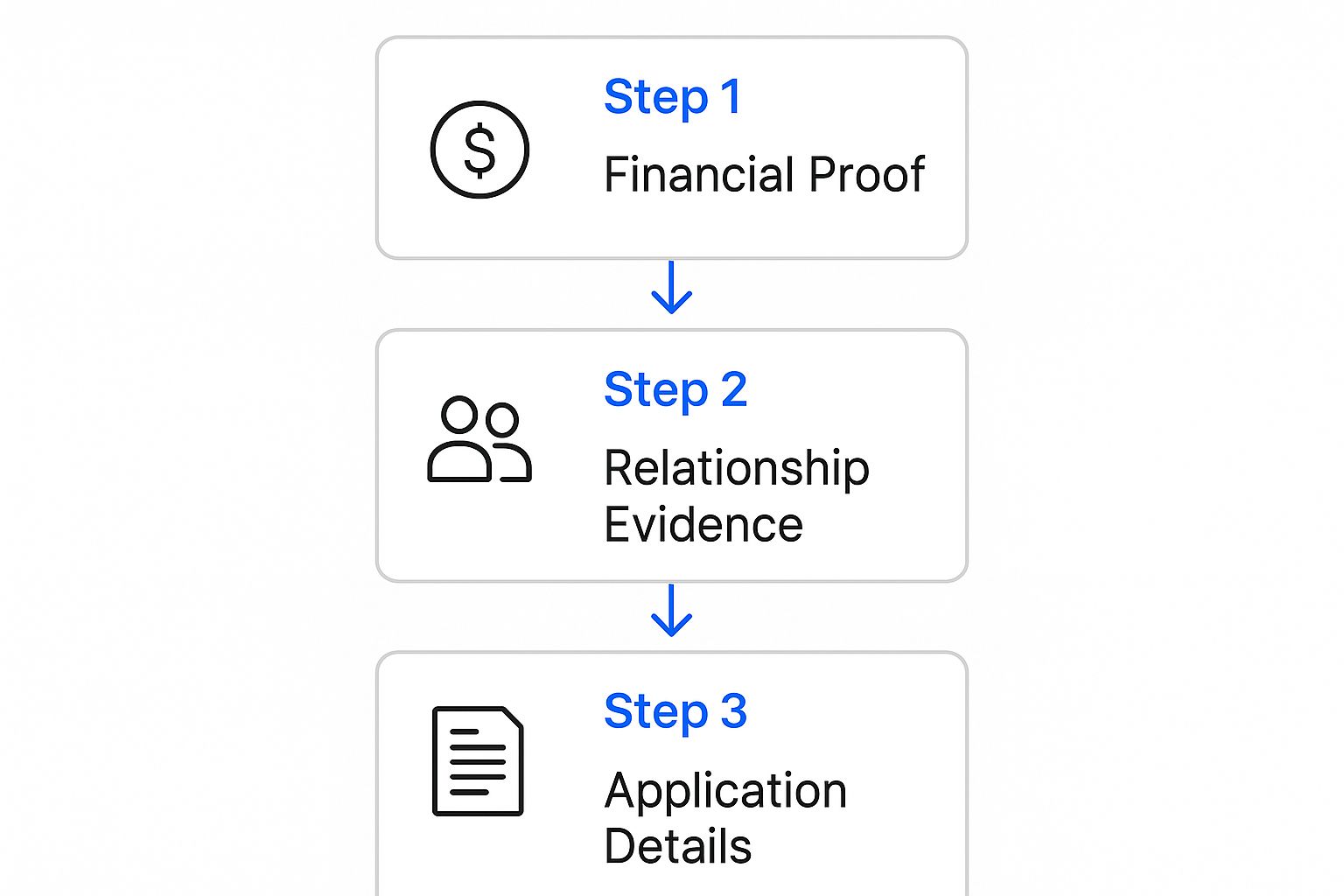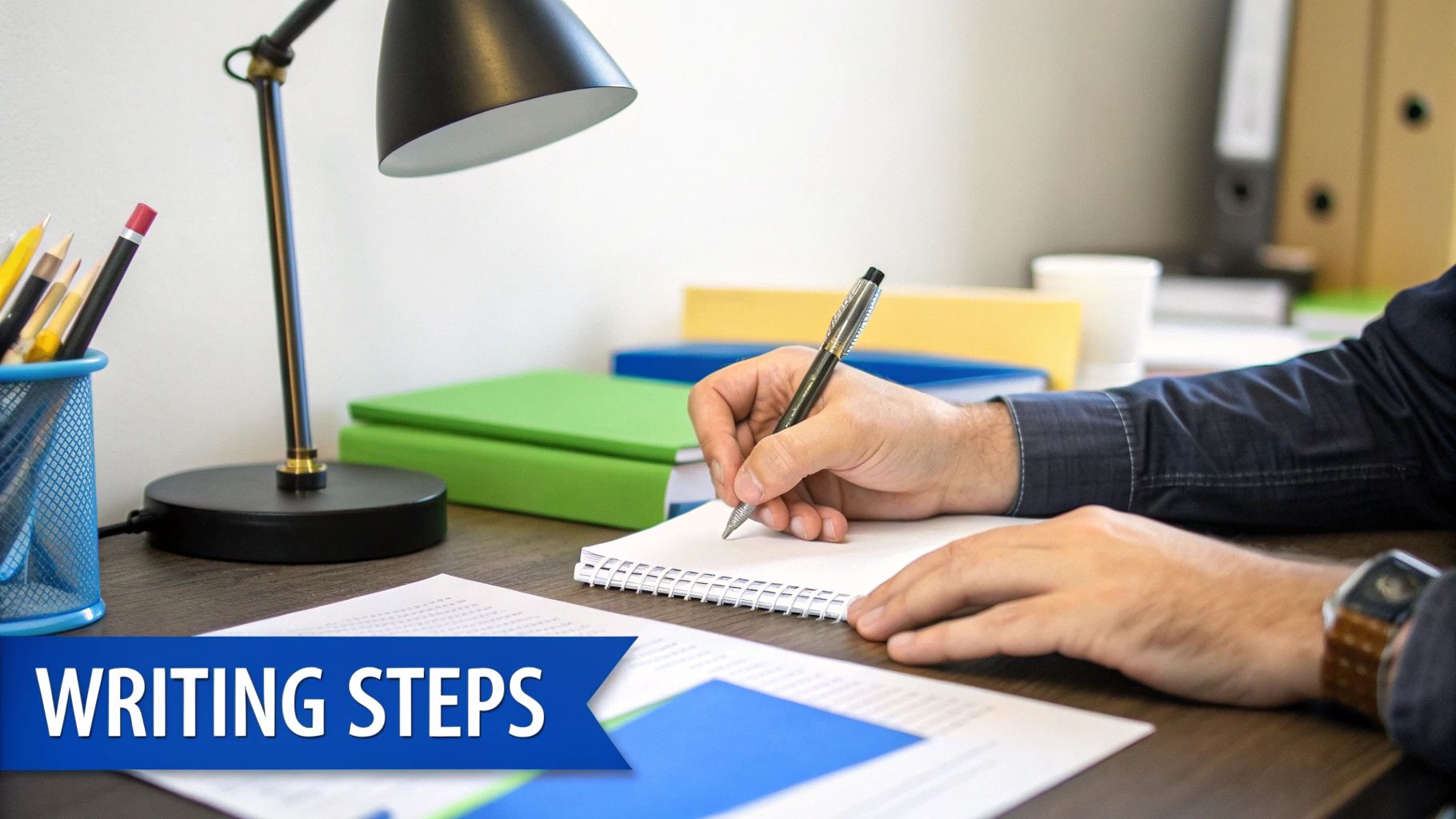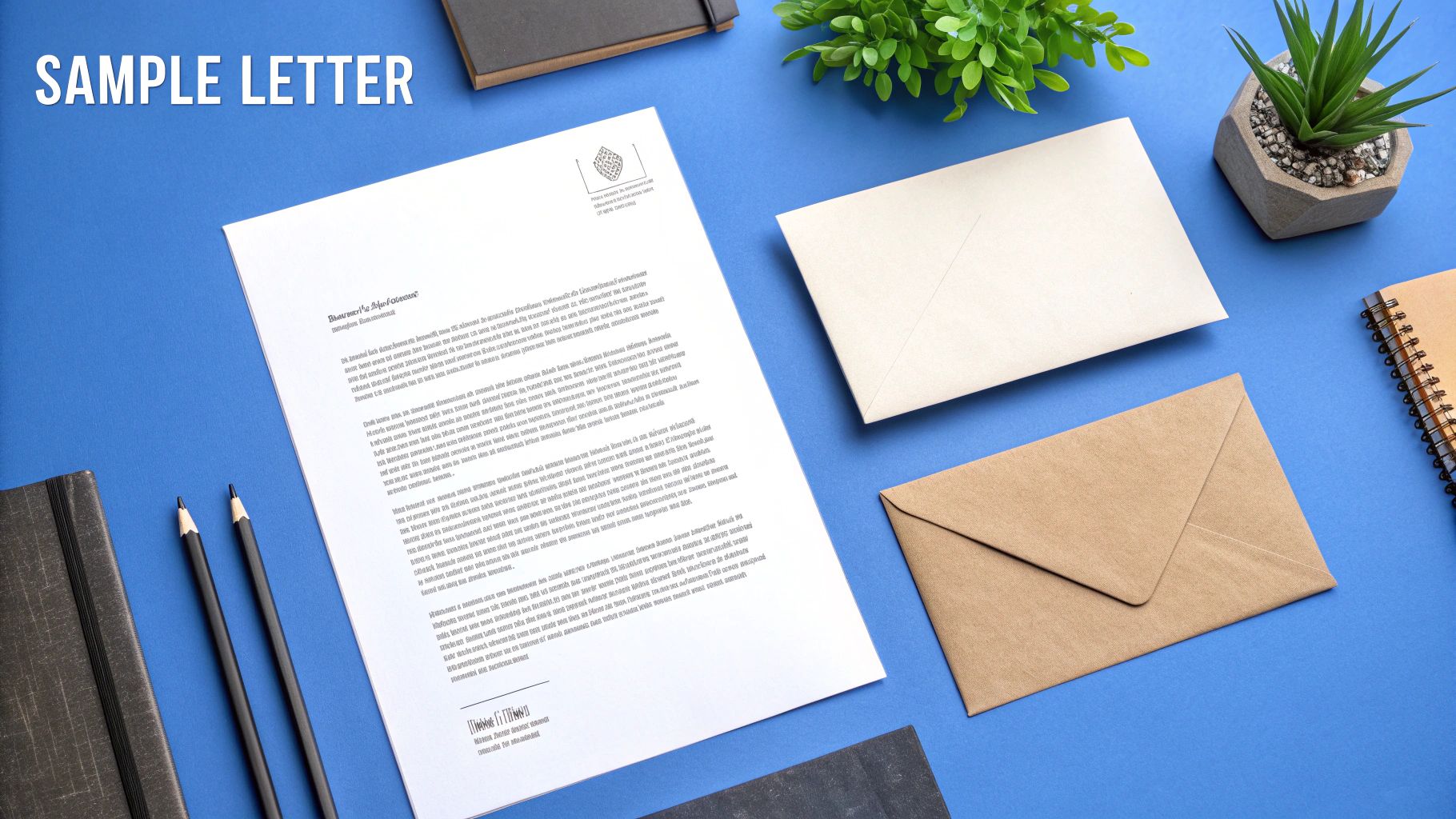Writing a Sponsorship Letter for Visa Applications: A Nigerian’s Guide

A visa sponsorship letter is essentially a formal promise. It’s a document written by someone in your destination country—a person or an organisation—confirming they’ll support you financially or logistically during your stay. For Nigerian applicants, this letter is a huge deal. It tells the embassy you have a solid reason for your trip and, crucially, that you won't become a financial burden on their country. Think of it as having someone credible, like a family member, vouch for you.
Why a Sponsorship Letter Can Make or Break Your Application

Let's be clear: for many Nigerians hoping to get a visa, the sponsorship letter is often the single most important document in their entire application file. It’s not just a piece of administrative fluff; it's a powerful signal to the consular officer that your trip is legitimate and you won’t overstay or run out of money.
You need to paint a complete, believable picture for the visa officer, and this letter is the cornerstone of that story. It’s your proof that the visit is well-planned, fully supported, and, most importantly, temporary.
Proving Your Purpose and Financial Stability
At its core, a strong sponsorship letter for a visa application does two things for a Nigerian applicant. First, it spells out exactly why you're travelling. Second, it provides undeniable proof that you have the financial backing to cover all your expenses.
Let’s look at a couple of real-world scenarios common in Nigeria:
- A mother in Lagos is sponsoring her son's study visa to Canada. Her letter needs to prove she can comfortably cover his tuition, accommodation, and general living costs for the duration of his course.
- An older brother working in the US wants his sibling from Abuja to visit for a graduation ceremony. His letter must show he can host them and handle all their expenses during the trip.
In situations like these, the letter is a formal declaration of responsibility. It transforms a hopeful application into a credible one. Without that clear commitment on paper, the visa officer is often left to assume the worst.
Assuring the Embassy of Your Ties to Nigeria
Beyond just the money, the sponsorship letter plays a vital role in establishing your strong ties to Nigeria. This is a massive point of concern for embassies. They need to be convinced you have compelling reasons to return home once your visa expires.
A well-crafted letter reinforces that your trip is temporary. It shows you have a support system waiting for you abroad and, crucially, back home—whether it's family, a job at a company in Lagos, or studies at a Nigerian university you plan to resume. This helps put to rest any suspicion that you might try to overstay your visa.
When it comes to work visas, the stakes are even higher. Just look at the US H-1B lottery for Fiscal Year 2025-2026, where the selection rate was only about 21.8%. This statistic underscores just how competitive the process is and why a flawless employer sponsorship letter is non-negotiable for Nigerian professionals aiming to secure one of those coveted spots. You can read more about the H-1B visa lottery odds to get a better sense of the competitive landscape.
Essential Elements for Your Sponsorship Letter
To give you a clearer picture, I've put together a quick overview of the non-negotiable details every sponsorship letter must include to satisfy embassy requirements. Getting these right is the first step to a successful application.
| Component | Why It Is Crucial for a Nigerian Applicant |
|---|---|
| Sponsor's Full Details | The embassy needs to verify the sponsor's identity and status. This includes their full name, address, phone number, and proof of legal status (e.g., passport, permanent residency card). |
| Applicant's Full Details | Clearly state the applicant's full name, date of birth, address, and passport number to link the letter directly to the correct application file. |
| Relationship to Applicant | Explaining the relationship (e.g., parent, sibling, employer) builds credibility and provides context for the sponsorship. Vague connections raise red flags. |
| Purpose and Duration of Trip | Be specific. Is it for tourism, a wedding, graduation, or medical treatment? State the exact planned dates of arrival and departure. |
| Declaration of Financial Responsibility | This is the heart of the letter. Explicitly state what expenses will be covered—flights, accommodation, food, tuition, health insurance, etc. Leave no room for ambiguity. |
| Proof of Financial Capacity | Words aren't enough. The sponsor must attach concrete evidence, such as bank statements, pay stubs, or an employment letter, to prove they can afford to sponsor you. |
| Sponsor's Signature | A hand-signed letter (or a notarised one, if required by the specific embassy) makes the document legally binding and official. |
Nailing every one of these components shows the consular officer that you've done your homework and that your application is both serious and well-supported. It’s about building a case so strong they have no reason to say no.
Choosing a Credible Sponsor and Their Required Proof
Picking the right person to sponsor your visa application is a decision you can't take lightly. Embassies don’t just accept a letter from anyone; they’re looking for a credible sponsor—someone with a genuine, verifiable relationship to you and a rock-solid financial footing.
Typically, your best bet is a close family member. We’re talking about parents, a spouse, or siblings who have a stable income that's easy to prove. The family connection is straightforward and makes perfect sense to a visa officer.
But what if your sponsor is an uncle in America, an auntie in the UK, or a very close family friend who's practically family? It’s definitely possible, but it means you've got more work to do. You’ll need to go the extra mile with evidence to prove the relationship is real and has stood the test of time, not just something cobbled together for the visa application.
Demonstrating Your Sponsor's Financial Muscle
The number one job of your sponsor's letter and supporting documents is to prove, without a shadow of a doubt, that they can cover your entire trip. A simple promise in a letter just won't cut it; you need to back up every claim with official proof. This is where so many applications stumble.
Your sponsor needs to lay their financial cards on the table, creating a clear and compelling picture. This isn’t a time to be vague or hold back. You need to present a case so strong that the visa officer has zero questions about your sponsor's ability to handle every single expense.
To paint this convincing picture, you'll need a specific set of documents.
Here's a pro tip I've learned over the years: consistency is king. The story told by the bank statements, the employment letter, and the payslips must be perfectly aligned. Even a tiny discrepancy can raise a red flag and put your whole application at risk.
A Practical Checklist of Required Documents
Think of this part as building your evidence file. Your sponsor needs to gather a few non-negotiable documents to go along with the sponsorship letter. They all have to be recent and official.
Here’s a simple checklist of what is almost always required:
- Official Bank Statements: You'll need the last six months' worth of statements from a well-known bank (like GTBank, Zenith Bank, or First Bank in Nigeria, or their international equivalents). These statements need to show a steady flow of income and a healthy closing balance. Avoid sudden, large deposits right before applying, as this is a major red flag for "borrowed funds."
- An Employment Letter: This needs to be an official letter on the company’s letterhead. It must state the sponsor’s job title, their annual salary, and their employment start date. It’s solid proof of a legitimate and stable source of income.
- Recent Payslips: Providing payslips from the last three to six months directly backs up the salary figure claimed in the employment letter.
- Proof of Relationship: For immediate family, this is simple—birth certificates or marriage certificates do the trick. If your sponsor is a friend or a more distant relative, get creative. Think old photos together, screenshots of WhatsApp chats, or even old letters that show you've known each other for years.
Getting the financial evidence right is a make-or-break part of the process. If you're applying to Canada, for instance, their requirements are quite specific. You can get the full rundown on what they look for in our guide on proof of funds in Canada. It’s also worth noting that different regions have different documents that serve a similar purpose; for example, a No Objection Certificate (NOC) in Dubai can be a crucial piece of evidence confirming official support or permission for travel.
Crafting Your Sponsorship Letter From Start to Finish
Alright, you've figured out who can be a credible sponsor and what documents they need to prove it. Now, let's get our hands dirty and actually write the sponsorship letter for visa applications. This is where we move from theory to action, putting together a letter that's clear, convincing, and leaves no room for doubt in the visa officer's mind.
The way you address the letter sets a professional tone from the get-go. It needs to be directed to the official reviewing your case. For instance, if you're applying for a US visa in Nigeria, a proper salutation would be "The Visa Officer, U.S. Consulate General, Lagos." It's a small detail, but it shows you understand the formal process.
The Opening Paragraph: Your Introduction
Your first paragraph has one job: get straight to the point. This isn't the place for a long-winded story. Your sponsor should immediately introduce themselves, state their legal status in the destination country (citizen, permanent resident, etc.), and clearly define their relationship to you, the applicant.
Imagine a father in Abuja sponsoring his son for a UK student visa. His opening could be something like this:
"My name is [Sponsor's Full Name], a Nigerian citizen and permanent resident of the United Kingdom, residing at [Sponsor's UK Address]. I am writing to confirm my full financial sponsorship for my son, [Applicant's Full Name], in support of his UK Student Visa application."
See how that works? In just two sentences, it establishes the key players and the letter's purpose. No fluff.
The Body Paragraphs: Detailing the Commitment
This is the core of your letter, where your sponsor lays out the specifics of their support. They need to detail the purpose of your trip and make an undeniable financial commitment. Ambiguity is your worst enemy here.
A vague phrase like "I will be responsible for all his expenses" isn't enough. It's good, but being more specific is so much better.
Let's stick with our Abuja-based father. A much stronger statement would be:
"I will be covering all costs associated with my son’s education and stay in the UK. This includes his full tuition fees at the University of Manchester, accommodation costs for the duration of his course, return flight tickets from Abuja to London, daily living expenses, and any potential medical costs."
That level of detail demonstrates a well-thought-out plan, not just a casual promise. Remember, the visa sponsorship process in Nigeria is heavily scrutinised by consular bodies. For US visa applications, for instance, the U.S. Consulate General in Lagos requires notarised letters that explicitly verify financial support. This is exactly why such clear, detailed language is absolutely critical.
To help you visualise the key components of this process, here's a simple breakdown.

As you can see, proving your financials and your relationship are the foundational steps you must nail before you even think about finalising the rest of your application.
The Conclusion: Reinforcing Support and Ties to Nigeria
Finally, the closing paragraph needs to wrap everything up neatly. Here, the sponsor should reiterate their full support for your application and, just as importantly, briefly mention your compelling ties to Nigeria. This is a crucial last touch to reassure the visa officer that you fully intend to return home.
A strong conclusion might read:
"I am confident that [Applicant's Name] will abide by all the rules of his student visa. He is a dedicated student who is eager to return to Nigeria after his studies to begin his career and contribute to our family business in Abuja."
This simple statement reinforces your temporary intent. While this letter focuses on financial backing, you can dive deeper into your personal motivations in a separate document. We cover this in our guide on writing a https://blog.japachat.com/letter-of-intent-for-visa-application/. And if you want to get a better handle on the principles of clear, formal writing, you might find this expert guidance on how to write legal documents really helpful.
A Real-World Example: Sponsorship Letter for a Nigerian Applicant

Theory is one thing, but seeing it in action makes all the difference. To bring it all together, let’s walk through a sample letter with annotations explaining the why behind each section.
We'll use a very common scenario: a father in Lagos, Nigeria, sponsoring his daughter’s application for a US tourist visa.
The Sample Letter
[Sponsor's Full Name, e.g., Chief Emeka Okoro]
[Sponsor's Full Address in Nigeria, e.g., 15 Adeola Odeku Street, Victoria Island, Lagos]
[Sponsor's Phone Number]
[Sponsor's Email Address]
[Date]
The Visa Officer,
U.S. Consulate General,
Walter Carrington Crescent,
Victoria Island, Lagos.
(Note: You must get this right. Always use the address for the specific embassy or consulate handling the application—whether that's in Lagos or Abuja.)
Subject: Letter of Sponsorship for [Applicant’s Full Name], Passport No: [Applicant’s Passport Number]
(Note: This isn't just a formality. A sharp, specific subject line helps the visa officer immediately link this letter to your daughter's file. It saves them time and reduces the risk of confusion.)
Dear Sir/Madam,
I, Chief Emeka Okoro, a Nigerian citizen, am writing to confirm my full financial sponsorship for my daughter, [Applicant’s Full Name], as she applies for a B-2 Tourist Visa. Her planned visit to the United States is for tourism, from [Start Date of Trip] to [End Date of Trip].
(Note: The opening gets straight to the point. It clearly states who you are, your relationship to the applicant, and the exact purpose and dates of the trip. There's no room for ambiguity here.)
I work as the Managing Director at [Sponsor's Company Name] in Lagos, a role I’ve held for the past 15 years. My annual income is [Sponsor's Annual Income in Naira], and I have sufficient funds to cover all her travel expenses without affecting my own financial commitments. As proof, I have attached my last six months of bank statements from GTBank, a letter from my employer, and my most recent payslips.
(Note: This paragraph is all about building financial credibility. Mentioning your job title and how long you've been there shows stability. Stating your income and, crucially, attaching the proof makes your promise to sponsor her believable, not just an empty statement.)
During her visit, I will be responsible for every cost associated with her trip. This includes her return flight ticket from Lagos to New York, accommodation, daily meals, local transport, health insurance, and any other incidental costs that might come up. I’ve also included a detailed itinerary for her two-week stay.
My daughter, [Applicant's Name], is a final-year student at the University of Lagos. She is scheduled to resume her studies on [Date of Resumption]. She has deep family roots and academic obligations here in Nigeria, and she is fully committed to returning home after her short holiday.
(Note: This is arguably the most important paragraph. It directly tackles the embassy's biggest concern: "Will the applicant return home?" By highlighting her university studies, you're providing a powerful, verifiable reason—a strong tie—for her to come back to Nigeria.)
Thank you for your time and for considering her application. Should you need any further information from me, please do not hesitate to get in touch.
Yours Faithfully,
(Sponsor’s Signature)
Chief Emeka Okoro
(Note: A physical, handwritten signature is non-negotiable. It makes the document official and shows you stand by everything you've written. Always sign the printed letter.)
Costly Mistakes to Avoid When Applying from Nigeria
It's a tough pill to swallow when a visa refusal comes down to a simple, avoidable mistake in your sponsorship letter. From my experience, many applications from Nigeria aren't rejected because the trip itself is questionable, but because the supporting documents raise serious red flags.
Let's walk through the most common pitfalls so your application is credible, clean, and gives the visa officer every reason to say yes.
One of the fastest routes to a denial is picking a sponsor whose finances look shaky. If you submit bank statements with lots of last-minute, unusual deposits or a consistently low balance, you're immediately contradicting the promises made in the letter. The numbers need to paint a clear picture of financial stability.
The Problem with "Visa Agents" and Fake Documents
In Nigeria, it can be tempting to use "visa agents" who promise a guaranteed outcome, but this is a very risky path. These agents often create fake bank statements or employment letters for a fee, and you have to understand that embassy officials are experts at spotting these fakes.
The fallout is devastating. Getting caught with fraudulent documents doesn't just mean a visa denial. It can lead to a long-term, sometimes permanent, ban from entering that country. This is officially known as visa application misrepresentation, and its consequences are far more serious than just a refused trip.
The risk is never worth it. One fake document can permanently damage your ability to travel to that country, even for genuine reasons down the line. Always be truthful.
Watch Out for Widespread Scams
The desperation some applicants feel has unfortunately created a market for scammers. You've probably seen those social media posts promising things like "Free USA Visa Sponsorships" or fake government grants, often using pictures of Nigerian presidents to look official.
Fact-checkers have repeatedly confirmed these are scams designed to steal your personal information. A quick search on fraudulent visa sponsorship claims shows just how common they are. This is a critical reminder to get your information only from official embassy or consulate websites.
Other Common Slip-ups to Avoid
Beyond outright fraud, a few smaller but equally damaging errors can weaken your application. Make sure you don't fall into these traps:
- Being Too Casual: A sponsorship letter is a formal document. Keep slang, overly emotional pleas, and a chatty tone out of it. Professionalism is key.
- Contradicting Yourself: Every detail matters. The dates, names, and financial figures in the letter must perfectly align with everything else—your visa form, flight bookings, and bank statements. Any inconsistency creates doubt.
- Vague Promises: Simply stating you will "cover all costs" isn't good enough. Be specific. Clearly list what you're paying for—flights, accommodation, meals, health insurance, etc. This shows you have a concrete, well-organised plan.
Frequently Asked Questions About Sponsorship Letters

Even after following a guide, it’s natural to have a few questions pop up when you're finalising something as important as a visa sponsorship letter. Let’s tackle some of the most common queries we get from Nigerians to clear up any lingering doubts.
Who Is The Best Person To Sponsor Me?
Ideally, your sponsor should be a close family member who is a citizen or legal resident in the country you want to visit. Think of a parent, spouse, or sibling with a steady, provable income. The connection is clear and makes immediate sense to a visa officer, which is exactly what you want.
Can an uncle, aunt, or a close family friend sponsor you? Yes, but it’s a bit more work. You’ll need to provide much stronger evidence to show why this person is financially backing your trip and prove that your relationship is genuine.
The key here is your sponsor's credibility. A consular officer would much rather see a sponsor with a modest but stable and well-documented income than someone with a massive, unexplained, or inconsistent cash flow.
Must The Sponsorship Letter Be Notarised?
This really depends on the embassy. Some countries, particularly the US for certain visa categories, might ask for the letter to be notarised. This turns it into a sworn legal statement, adding a layer of formality.
However, for many other countries, like the UK, a straightforward signature is all that's needed.
The golden rule is to always check the official website of the specific embassy you’re applying to. Their guidelines are the final word. Don’t just assume – find out for sure before your sponsor signs anything.
What If My Sponsor Lives In A Different Country?
This scenario is possible, but it can definitely make your application more complex. The most straightforward case is having a sponsor who lives in the country you're travelling to. It’s easier to verify their legal status and financial standing within that country’s system.
If your sponsor lives elsewhere—say, your father in Nigeria is sponsoring your trip to Germany—they need to come with exceptionally strong financial documents. They also need to provide a very convincing reason for funding your trip to a country where they don't even live. It raises questions, so you need to have solid answers.
Planning a move abroad has its stressful moments, but you don't have to figure it all out by yourself. JapaChat is Nigeria's AI immigration expert, designed to provide instant, reliable answers for your journey. Get started for free on JapaChat and join over 10,000 Nigerians who are planning their next chapter with confidence.

Leave a Reply